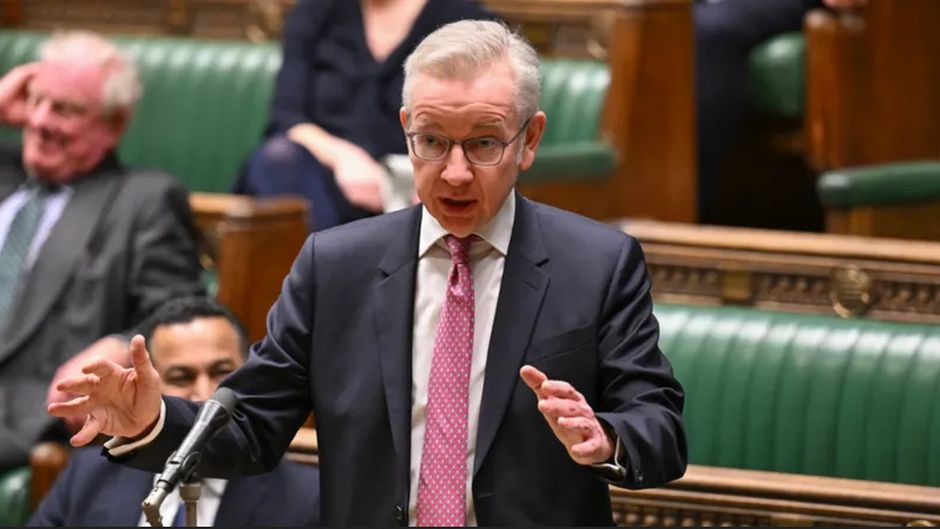“Extremism is the promotion of an ideology based on violence, hatred or intolerance”, says the new legal definition of the government. Evangelical organisations see a risk in “subjective” decisions about what beliefs can or cannot be expressed.
 Michael Gove presenting the new definition of extremism. / BBC You tube screenshot .
Michael Gove presenting the new definition of extremism. / BBC You tube screenshot .
The British government unveiled a new definition of extremism on 14 March, which aims to “protect democratic values” by being “clear and precise in identifying the dangers posed by extremism”.
The government tries to respond to a rise in hate speech in the UK after the terrorist attacks in Israel and the current war in Gaza.
“The pervasiveness of extremist ideologies has become increasingly clear in the aftermath of the 7 October attacks and poses a real risk to the security of our citizens and our democracy”, said Michael Gove, secretary of state for levelling up, housing and communities.
The new definition is “narrower and more precise” than the 2011 definition and will not target those with “private, peaceful beliefs”.
It states that “extremism is the promotion or advancement of an ideology based on violence, hatred or intolerance, that aims to negate or destroy the fundamental rights and freedoms of others; or undermine, overturn or replace the UK’s system of liberal parliamentary democracy and democratic rights; or intentionally create a permissive environment for others to achieve those results”.
Gove named three Muslim organisations (Muslim Association of Britain, CAGE and Muslim Engagement and Development) which he said “give rise to concern for their Islamist orientation and views”.
He also referred to two groups (the British National Socialist Movement and Patriotic Alternative) he described as “extreme right-wing”, because the “promote neo-Nazi ideology, argue for forced repatriation, a white ethno-state, and the targeting of minority groups for intimidation”.
The government is expected to publish a full list of organisations covered by the definition in the coming weeks.
Organisations or individuals considered extremist will not be criminalised, but will be barred from contact with government and will not receive government funding. They will have the right to seek reassessment and submit new evidence to a review.
To ensure that government has the tools it needs, a new unit, the Counter-Extremism Centre of Excellence, has been set up, which will “draw on the expertise of the Commission for Countering Extremism as well some of the country’s foremost counter-extremism experts”.
A range of secular advocacy groups and legal have experts received these new definitions of the UK government with concern, stressing the rights of some could be affected.
Among those who were critical with the proposal are the Anglican archbishops of Canterbury and York, Justin Welby and Stephen Cottrell, who issued a joint statement warning that “instead of providing clarity or striking a conciliatory tone, labelling a multi-faceted problem as hateful extremism may vilify the wrong people and risk yet more division”.
According to the Church of England leader, the new definition “not only inadvertently threatens freedom of speech, but also the right to worship and peaceful protest, things that have been hard won and form the fabric of a civilized society”.
Christian Concern, an advocacy group, also sadi “the new definition of extremism is not fit for purpose”. It would be ”absurd that Christians could be deemed ‘extremist’ for believing in real marriage or for being pro-life”. That is why they called on the government “to urgently clarify what ‘fundamental rights’ are intended in the definition of extremism” .
Another group, The Christian Institute, also warned that “widening the current definition would lead to greater censorship that could see those with traditional views excluded from debate”.
In an interview with UCB News, the United Kingdom director of the Evangelical Alliance (EAUK), Peter Lynas, pointed out that “the concern is, do we still have free speech?”.
“I disagree with Muslims fundamentally, but I also respect their freedom, and if their religious beliefs are being targeted, it could just easily be us next week, next month or year. So we definitively want to protect religious freedom”.
For Lynas, the new definition might affect chuches and Christian organisations, because “the possibility to engage on behalf of others and the access to various forms of funding and support” could be restricted by the authorities, who will always have a degree of “subjectivityv in their decision-making.
At the same time, he emphasised that “there is not even a list yet, there is a lack of clarity. I am not overly concerned about it, but we need to be alert to the challenge that this brings”, added the EAUK director.
Asked about how Christians can deal with the current tensions in the public arena, Lynas said that “we have to model good public engagement, be clear that everybody is made as an image of God, and hold them with honour. But we must also challenge some ideas that are absolutely unacceptable. We need to pray to engage well in those situations”.
[analysis]
[title]One more year[/title]
[photo][/photo]
[text]At Evangelical Focus, we have a sustainability challenge ahead. We invite you to join those across Europe and beyond who are committed with our mission. Together, we will ensure the continuity of Evangelical Focus and Protestante Digital (Spanish) in 2024.
Learn all about our #OneMoreYearEF campaign here (English).
[/text][/analysis]

Las opiniones vertidas por nuestros colaboradores se realizan a nivel personal, pudiendo coincidir o no con la postura de la dirección de Protestante Digital.
Si quieres comentar o